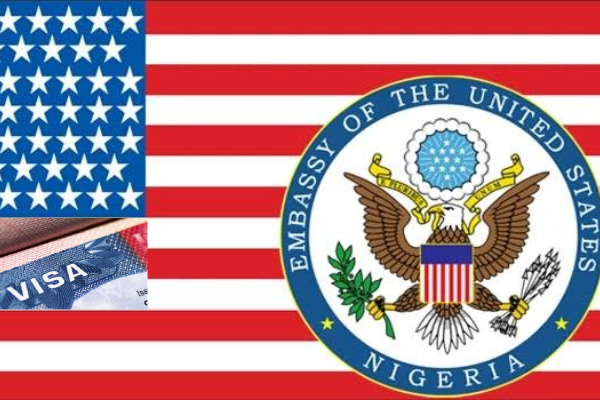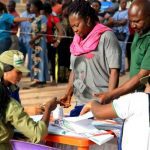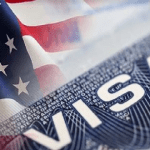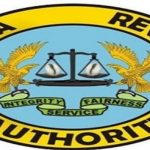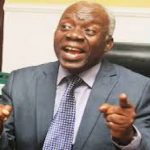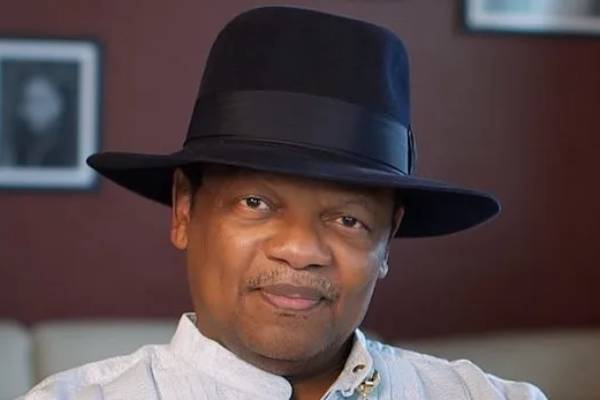The United States of America has announced that anyone who promotes violence will face visa restrictions when Nigeria holds its general election in 2023.
America’s Deputy Assistant Secretary of State for Africa, Mr Michael Gonzales, issued the warning at a Johns Hopkins University international conference titled “United States Policy and Nigeria’s National Decisions in the 2023 Elections.”
The virtual conference, held at the School of Advanced International Studies in Washington DC, brought together Nigerian and American policymakers to discuss issues surrounding the 2023 general elections.
The US government, according to Gonzales, “will continue to use our messaging, as well as other diplomatic channels at our disposal, including visa restrictions where warranted, to dissuade those who may be tempted to use violence to undermine Nigeria’s democratic process.”
According to him, the US government is still committed to working with Nigeria to ensure a peaceful power transition in 2023.
Patrick Okigbo, Founding Partner of Nextier, clarified that the conference was held in the United States to bring election issues and conversations to the international stage.
He emphasised the importance of Nigeria’s international partners assisting in the country’s democratic process, while emphasizing that “democracy is not an end state, but a project that requires continuous nurturing.”
He also warned that failing to address the issues raised at the conference could have disastrous consequences, whereas heeding the recommendations could yield a bountiful harvest.
Retired Brig.-Gen. Saleh Bala noted in his contribution that “security challenges in Nigeria are true, present, and tangible, but what remains consistent is the lurking shadow of elite interests and how they serve their interests.”
In the face of widespread insecurity, the proliferation of small arms and light weapons, the rise of self-help groups, and increased secessionist agitations in southern Nigeria, the conference concluded that poor election management, particularly the rotational presidency convention, could jeopardize Nigeria’s democracy.
Ms. Idayat Hassan, Director of the Centre for Democracy and Development, stated that “political parties could not campaign during the Anambra governorship election cycle due to insecurity,” and that worse scenarios could occur in 2023.
The United States of America has announced that anyone who promotes violence will face visa restrictions when Nigeria holds its general election in 2023.
America’s Deputy Assistant Secretary of State for Africa, Mr Michael Gonzales, issued the warning at a Johns Hopkins University international conference titled “United States Policy and Nigeria’s National Decisions in the 2023 Elections.”
The virtual conference, held at the School of Advanced International Studies in Washington DC, brought together Nigerian and American policymakers to discuss issues surrounding the 2023 general elections.
The US government, according to Gonzales, “will continue to use our messaging, as well as other diplomatic channels at our disposal, including visa restrictions where warranted, to dissuade those who may be tempted to use violence to undermine Nigeria’s democratic process.”
According to him, the US government is still committed to working with Nigeria to ensure a peaceful power transition in 2023.
Patrick Okigbo, Founding Partner of Nextier, clarified that the conference was held in the United States to bring election issues and conversations to the international stage.
He emphasised the importance of Nigeria’s international partners assisting in the country’s democratic process, while emphasizing that “democracy is not an end state, but a project that requires continuous nurturing.”
He also warned that failing to address the issues raised at the conference could have disastrous consequences, whereas heeding the recommendations could yield a bountiful harvest.
Retired Brig.-Gen. Saleh Bala noted in his contribution that “security challenges in Nigeria are true, present, and tangible, but what remains consistent is the lurking shadow of elite interests and how they serve their interests.”
In the face of widespread insecurity, the proliferation of small arms and light weapons, the rise of self-help groups, and increased secessionist agitations in southern Nigeria, the conference concluded that poor election management, particularly the rotational presidency convention, could jeopardize Nigeria’s democracy.
Ms. Idayat Hassan, Director of the Centre for Democracy and Development, stated that “political parties could not campaign during the Anambra governorship election cycle due to insecurity,” and that worse scenarios could occur in 2023.
The United States of America has announced that anyone who promotes violence will face visa restrictions when Nigeria holds its general election in 2023.
America’s Deputy Assistant Secretary of State for Africa, Mr Michael Gonzales, issued the warning at a Johns Hopkins University international conference titled “United States Policy and Nigeria’s National Decisions in the 2023 Elections.”
The virtual conference, held at the School of Advanced International Studies in Washington DC, brought together Nigerian and American policymakers to discuss issues surrounding the 2023 general elections.
The US government, according to Gonzales, “will continue to use our messaging, as well as other diplomatic channels at our disposal, including visa restrictions where warranted, to dissuade those who may be tempted to use violence to undermine Nigeria’s democratic process.”
According to him, the US government is still committed to working with Nigeria to ensure a peaceful power transition in 2023.
Patrick Okigbo, Founding Partner of Nextier, clarified that the conference was held in the United States to bring election issues and conversations to the international stage.
He emphasised the importance of Nigeria’s international partners assisting in the country’s democratic process, while emphasizing that “democracy is not an end state, but a project that requires continuous nurturing.”
He also warned that failing to address the issues raised at the conference could have disastrous consequences, whereas heeding the recommendations could yield a bountiful harvest.
Retired Brig.-Gen. Saleh Bala noted in his contribution that “security challenges in Nigeria are true, present, and tangible, but what remains consistent is the lurking shadow of elite interests and how they serve their interests.”
In the face of widespread insecurity, the proliferation of small arms and light weapons, the rise of self-help groups, and increased secessionist agitations in southern Nigeria, the conference concluded that poor election management, particularly the rotational presidency convention, could jeopardize Nigeria’s democracy.
Ms. Idayat Hassan, Director of the Centre for Democracy and Development, stated that “political parties could not campaign during the Anambra governorship election cycle due to insecurity,” and that worse scenarios could occur in 2023.
The United States of America has announced that anyone who promotes violence will face visa restrictions when Nigeria holds its general election in 2023.
America’s Deputy Assistant Secretary of State for Africa, Mr Michael Gonzales, issued the warning at a Johns Hopkins University international conference titled “United States Policy and Nigeria’s National Decisions in the 2023 Elections.”
The virtual conference, held at the School of Advanced International Studies in Washington DC, brought together Nigerian and American policymakers to discuss issues surrounding the 2023 general elections.
The US government, according to Gonzales, “will continue to use our messaging, as well as other diplomatic channels at our disposal, including visa restrictions where warranted, to dissuade those who may be tempted to use violence to undermine Nigeria’s democratic process.”
According to him, the US government is still committed to working with Nigeria to ensure a peaceful power transition in 2023.
Patrick Okigbo, Founding Partner of Nextier, clarified that the conference was held in the United States to bring election issues and conversations to the international stage.
He emphasised the importance of Nigeria’s international partners assisting in the country’s democratic process, while emphasizing that “democracy is not an end state, but a project that requires continuous nurturing.”
He also warned that failing to address the issues raised at the conference could have disastrous consequences, whereas heeding the recommendations could yield a bountiful harvest.
Retired Brig.-Gen. Saleh Bala noted in his contribution that “security challenges in Nigeria are true, present, and tangible, but what remains consistent is the lurking shadow of elite interests and how they serve their interests.”
In the face of widespread insecurity, the proliferation of small arms and light weapons, the rise of self-help groups, and increased secessionist agitations in southern Nigeria, the conference concluded that poor election management, particularly the rotational presidency convention, could jeopardize Nigeria’s democracy.
Ms. Idayat Hassan, Director of the Centre for Democracy and Development, stated that “political parties could not campaign during the Anambra governorship election cycle due to insecurity,” and that worse scenarios could occur in 2023.
The United States of America has announced that anyone who promotes violence will face visa restrictions when Nigeria holds its general election in 2023.
America’s Deputy Assistant Secretary of State for Africa, Mr Michael Gonzales, issued the warning at a Johns Hopkins University international conference titled “United States Policy and Nigeria’s National Decisions in the 2023 Elections.”
The virtual conference, held at the School of Advanced International Studies in Washington DC, brought together Nigerian and American policymakers to discuss issues surrounding the 2023 general elections.
The US government, according to Gonzales, “will continue to use our messaging, as well as other diplomatic channels at our disposal, including visa restrictions where warranted, to dissuade those who may be tempted to use violence to undermine Nigeria’s democratic process.”
According to him, the US government is still committed to working with Nigeria to ensure a peaceful power transition in 2023.
Patrick Okigbo, Founding Partner of Nextier, clarified that the conference was held in the United States to bring election issues and conversations to the international stage.
He emphasised the importance of Nigeria’s international partners assisting in the country’s democratic process, while emphasizing that “democracy is not an end state, but a project that requires continuous nurturing.”
He also warned that failing to address the issues raised at the conference could have disastrous consequences, whereas heeding the recommendations could yield a bountiful harvest.
Retired Brig.-Gen. Saleh Bala noted in his contribution that “security challenges in Nigeria are true, present, and tangible, but what remains consistent is the lurking shadow of elite interests and how they serve their interests.”
In the face of widespread insecurity, the proliferation of small arms and light weapons, the rise of self-help groups, and increased secessionist agitations in southern Nigeria, the conference concluded that poor election management, particularly the rotational presidency convention, could jeopardize Nigeria’s democracy.
Ms. Idayat Hassan, Director of the Centre for Democracy and Development, stated that “political parties could not campaign during the Anambra governorship election cycle due to insecurity,” and that worse scenarios could occur in 2023.
The United States of America has announced that anyone who promotes violence will face visa restrictions when Nigeria holds its general election in 2023.
America’s Deputy Assistant Secretary of State for Africa, Mr Michael Gonzales, issued the warning at a Johns Hopkins University international conference titled “United States Policy and Nigeria’s National Decisions in the 2023 Elections.”
The virtual conference, held at the School of Advanced International Studies in Washington DC, brought together Nigerian and American policymakers to discuss issues surrounding the 2023 general elections.
The US government, according to Gonzales, “will continue to use our messaging, as well as other diplomatic channels at our disposal, including visa restrictions where warranted, to dissuade those who may be tempted to use violence to undermine Nigeria’s democratic process.”
According to him, the US government is still committed to working with Nigeria to ensure a peaceful power transition in 2023.
Patrick Okigbo, Founding Partner of Nextier, clarified that the conference was held in the United States to bring election issues and conversations to the international stage.
He emphasised the importance of Nigeria’s international partners assisting in the country’s democratic process, while emphasizing that “democracy is not an end state, but a project that requires continuous nurturing.”
He also warned that failing to address the issues raised at the conference could have disastrous consequences, whereas heeding the recommendations could yield a bountiful harvest.
Retired Brig.-Gen. Saleh Bala noted in his contribution that “security challenges in Nigeria are true, present, and tangible, but what remains consistent is the lurking shadow of elite interests and how they serve their interests.”
In the face of widespread insecurity, the proliferation of small arms and light weapons, the rise of self-help groups, and increased secessionist agitations in southern Nigeria, the conference concluded that poor election management, particularly the rotational presidency convention, could jeopardize Nigeria’s democracy.
Ms. Idayat Hassan, Director of the Centre for Democracy and Development, stated that “political parties could not campaign during the Anambra governorship election cycle due to insecurity,” and that worse scenarios could occur in 2023.
The United States of America has announced that anyone who promotes violence will face visa restrictions when Nigeria holds its general election in 2023.
America’s Deputy Assistant Secretary of State for Africa, Mr Michael Gonzales, issued the warning at a Johns Hopkins University international conference titled “United States Policy and Nigeria’s National Decisions in the 2023 Elections.”
The virtual conference, held at the School of Advanced International Studies in Washington DC, brought together Nigerian and American policymakers to discuss issues surrounding the 2023 general elections.
The US government, according to Gonzales, “will continue to use our messaging, as well as other diplomatic channels at our disposal, including visa restrictions where warranted, to dissuade those who may be tempted to use violence to undermine Nigeria’s democratic process.”
According to him, the US government is still committed to working with Nigeria to ensure a peaceful power transition in 2023.
Patrick Okigbo, Founding Partner of Nextier, clarified that the conference was held in the United States to bring election issues and conversations to the international stage.
He emphasised the importance of Nigeria’s international partners assisting in the country’s democratic process, while emphasizing that “democracy is not an end state, but a project that requires continuous nurturing.”
He also warned that failing to address the issues raised at the conference could have disastrous consequences, whereas heeding the recommendations could yield a bountiful harvest.
Retired Brig.-Gen. Saleh Bala noted in his contribution that “security challenges in Nigeria are true, present, and tangible, but what remains consistent is the lurking shadow of elite interests and how they serve their interests.”
In the face of widespread insecurity, the proliferation of small arms and light weapons, the rise of self-help groups, and increased secessionist agitations in southern Nigeria, the conference concluded that poor election management, particularly the rotational presidency convention, could jeopardize Nigeria’s democracy.
Ms. Idayat Hassan, Director of the Centre for Democracy and Development, stated that “political parties could not campaign during the Anambra governorship election cycle due to insecurity,” and that worse scenarios could occur in 2023.
The United States of America has announced that anyone who promotes violence will face visa restrictions when Nigeria holds its general election in 2023.
America’s Deputy Assistant Secretary of State for Africa, Mr Michael Gonzales, issued the warning at a Johns Hopkins University international conference titled “United States Policy and Nigeria’s National Decisions in the 2023 Elections.”
The virtual conference, held at the School of Advanced International Studies in Washington DC, brought together Nigerian and American policymakers to discuss issues surrounding the 2023 general elections.
The US government, according to Gonzales, “will continue to use our messaging, as well as other diplomatic channels at our disposal, including visa restrictions where warranted, to dissuade those who may be tempted to use violence to undermine Nigeria’s democratic process.”
According to him, the US government is still committed to working with Nigeria to ensure a peaceful power transition in 2023.
Patrick Okigbo, Founding Partner of Nextier, clarified that the conference was held in the United States to bring election issues and conversations to the international stage.
He emphasised the importance of Nigeria’s international partners assisting in the country’s democratic process, while emphasizing that “democracy is not an end state, but a project that requires continuous nurturing.”
He also warned that failing to address the issues raised at the conference could have disastrous consequences, whereas heeding the recommendations could yield a bountiful harvest.
Retired Brig.-Gen. Saleh Bala noted in his contribution that “security challenges in Nigeria are true, present, and tangible, but what remains consistent is the lurking shadow of elite interests and how they serve their interests.”
In the face of widespread insecurity, the proliferation of small arms and light weapons, the rise of self-help groups, and increased secessionist agitations in southern Nigeria, the conference concluded that poor election management, particularly the rotational presidency convention, could jeopardize Nigeria’s democracy.
Ms. Idayat Hassan, Director of the Centre for Democracy and Development, stated that “political parties could not campaign during the Anambra governorship election cycle due to insecurity,” and that worse scenarios could occur in 2023.

